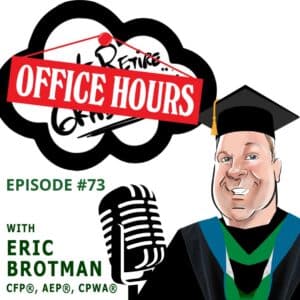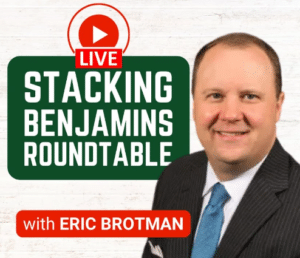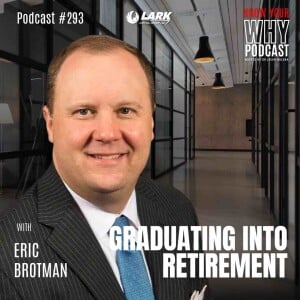Have a question? Post it in the comments, tweet it to us at @BrotmanPlanning, or post it on our Facebook and it may be used in a future episode of Office Hours!
Eric Brotman: [00:00:00] Welcome to Don’t Retire… Graduate!, the podcast that asks you what you want to be when you grow up so you can graduate into retirement with purpose and passion. I’m your host and valedictorian, Eric Brotman. Welcome to Office Hours where we answer listeners questions about personal finance, retirement readiness, and more.
We received a question from Kate who asked, will financial advisors become obsolete? And Kate, unless you know something, I don’t know. I certainly hope not. First of all, that’s how I make a living. But secondly, I think the value of a financial advisor has much more to do with behavior and psychology and decision making and accountability, then it does with necessarily expertise.
And so hear me out. In 40 years we’ve gone in this country from financial advisors, mostly being salespeople, stockbrokers who had this inside information, if you will, and I don’t mean illegally, but they had access to information. And so the [00:01:00] value of a advisor or broker at that time, Was understanding or hearing about or knowing about the companies and the kinds of managers and the kinds of products that consumers had no idea about?
Well, today, all of that information’s totally democratized. You can look up anything as you well know, and so it, there is no inside information and again, I’m not using that in a criminal way. I’m using that as having some extra knowledge necessarily about what’s out in the financial world. What we do have as financial advisors though, is a lot of experience with a lot of different families in different types of situations.
So where you might be looking to retire or be financial, independent and graduate once in your life, we’ve worked with folks hundreds of times to do that. We’ve seen ’em go well. We’ve seen ’em not go as well. We know some of the differences and some of the nuances, and we can help you in a way that has almost nothing to do with numbers.
Some of it does, certainly, and we have to [00:02:00] know our math, but the math can be done by a computer. You can have a computer algorithm allocate your portfolio for you. What it can’t do is help create context for you to remind you of not only has this happened before, because investing often isn’t logical or rational, but how do you feel about this and how is this gonna impact your life and what is most important to you?
I think the role of the financial advisor is getting more and more important. I do wonder because we’ve seen other industries go through changes as a result of either technology or information. CPAs, for example, are not necessarily doing simple tax returns anymore because simple tax returns can be handled by a TurboTax or other program.
But financial advising is very, very different than asset allocating. Asset allocating can be done lots of different ways. You can plug in some data points and it’ll tell you your risk tolerance. The problem is that it eliminates the human piece of this, Kate and the human piece is what was your day like [00:03:00] when you filled out your risk tolerance questionnaire?
What was your week like? What was the market like? If you filled that questionnaire out during the great financial crisis in 2008 and nine your answers might be very different than if it was during the roaring nineties when everything was going bonkers up. So I think it’s important to be adults and to understand that we’re all human.
We all make mistakes, and we all have these feelings. I think financial advisors in lots of ways are a little bit like personal trainers in that you know how to do a sit up and you know how to do a pushup. But if you don’t have somebody not only to be accountable to with an appointment, but also somebody who says, Hey, give me 10 more, you’ve got.
You may not do ’em, you might wind up on the couch with a bag of chips instead. So I say that lovingly, and I say that as somebody who has a personal trainer but knows how to work out and somebody who has a financial advisor, and I know the financial business. It’s helpful to have that second set, that dispassionate set of eyes on all the things you’re doing and to help sometimes talk you off the ledge when things are [00:04:00] rough or sometimes just give you context or sometimes be your accountability partner.
You know, you may or may not want to invest every month or invest every paycheck or make the changes you need for your employee benefits. Whether you understand it or not, it’s not something you’re necessarily thinking about. . But if you’re working with a, a good financial advisor who can walk you through that and say, you know what, this really makes more sense for you and it’s important and just do it.
It, it’s kind of like the difference between going to your physician or checking out Web MD and, and diagnosing yourself. Yeah, there’s information on the web but it may not be a accurate for you or be appropriate in any way for you to. So will financial advisors become obsolete? I certainly don’t think so.
In fact, I think there’s a great shortage of financial advisors. I think it’s a career that I hope more folks will, will look towards, and I hope it’s a major that more colleges will adopt because personal finance is incredibly important. It is incredibly [00:05:00] complex and some people who are great do it yourselfers are love to do it that way, but most.
Would prefer to think about other things than their finances. So I think financial advisors are around for good. We, we may, the, the industry will certainly change, but my chosen profession I think is gonna be here forever. And, and Kate, I, I hope this is one of those questions where, Rather than saying, I think this is what’s gonna happen.
I’m gonna go with, I hope this is what’s gonna happen because it’s, it’s what I do for a living. And I, and I love it. And I love working with the, the families we do. So I thank you for your question. We’re not going anywhere. If you don’t have an advisor, get one. They’re going to be around. And I thank you for participating in Office Hours.
If you’d like to send us a question, which we might answer at a future episode, post it on our Facebook page, or tweet us at brotman Planning. Thank you for listening and watching today. We’d love to hear from you. Send us a message or leave us comments at don’t retire graduate.com or on social media or leave ratings and reviews on your favorite podcast platform.
If you enjoy the show, [00:06:00] don’t keep us a secret. Share us with friends and family. Let them join you on your journey to financial freedom. I thank you for coming to Office Hours and look forward to seeing you again next Thursday. For now, this is your host, Eric Brotman. reminding you: Don’t retire. Graduate.
Don’t retire… graduate! Is part of the Evergreen Podcast Network.
Narrator: Securities offered through Kestra Investment Services, LLC. (Kestra IS) Member Finra, S I P C. Investment advisory Services offered through Kestra Advisory Services, LLC. (Kestra AS) an affiliate of Kestra IS. Kestra IS or Kestra AS are not affiliated with Brotman Financial or any other entity discussed.







